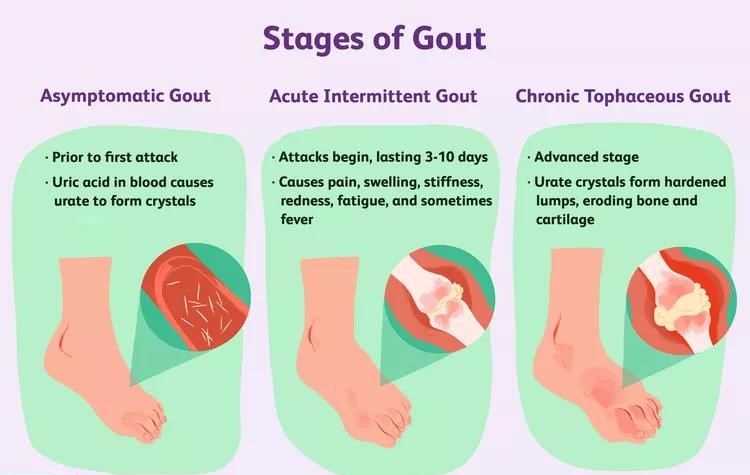How to lower uric acid levels naturally
Gout is a type of arthritis that develops when blood uric acid levels are atypically high. The uric acid forms crystals in the joints, often in the feet and big toes, which causes severe and painful swelling.
Some people need medication to treat gout, but diet and lifestyle changes may also help. Lowering uric acid can reduce the risk of the condition and may even prevent flares.However, the risk of gout depends on several factors, not just lifestyle. Risk factors include having obesity, being male, and having certain health conditions.
Limit high-purine food
Purines are compounds that occur naturally in some foods. As the body breaks down purines, it produces uric acid. The process of metabolizing purine-rich foods causes the production of too much uric acid, which may lead to gout.
Some otherwise nutritious foods contain a high amount of purines, which means a person may wish to reduce their intake instead of eliminating them all.
Foods with high purine content include:
- wild game, such as deer (venison)
- trout, tuna, haddock, sardines, anchovies, mussels, and herring
- excess alcohol, including beer and liquor
- high fat foods, such as bacon, dairy products, and red meat, including veal
- organ meats, such as liver and sweetbreads
- sugary foods and beverages
Eat more low purine foods
While some foods have a high purine level, others have a lower level. A person may include them in their diet to help lower their uric acid levels. Some foods with low purine content include:
- low fat and fat-free dairy products
- peanut butter and most nuts
- most fruits and vegetables
- coffee
- whole-grain rice, bread, and potatoes
While dietary changes alone will not eliminate gout, they may help prevent flare-ups. It is also important to note that not everyone who gets gout eats a high purine diet.
Avoid medications that raise uric acid levels
Certain medications may elevate uric acid levels. These include:
Diuretic drugs, such as furosemide (Lasix) and hydrochlorothiazide
Drugs that suppress the immune system, especially before or after an organ transplant
Low dose aspirin
Drugs that raise uric acid levels may offer essential health benefits, but people should speak with a doctor before stopping or changing any medications.
Maintain a healthy body weight
Maintaining a moderate body weight may help reduce the risk of gout flares, as obesity increases the risk of gout.
Experts recommend that people focus on making long-term, sustainable changes to manage their weight, such as becoming more active, eating a balanced diet, and choosing nutrient-dense foods. Maintaining a moderate weight can help lower blood uric acid levels and improve overall health.
Avoid alcohol and sugary drinks
Consuming a lot of alcohol and sugary drinks — such as sodas and sweetened juices — correlates with an increased risk of developing gout.
Alcohol and sweetened drinks also add unnecessary calories to the diet, potentially causing weight gain and metabolic issues, leading to increased uric acid levels.
Balance insulin
People with gout have an increased risk of diabetes. According to the Arthritis Foundation, females with gout are 71% more likely to have type 2 diabetes than people without gout,while males are 22% more likely.
Diabetes and gout have common risk factors, such as being overweight and having high cholesterol.
A study from 2015 showed that starting insulin treatment for people living with diabetes increased blood uric acid levels.
Add fiber
A high fiber diet may help reduce blood uric acid levels. Individuals can find fiber in various foods, including whole grains, fruits, and vegetables.
Gout is a painful medical condition that often occurs alongside other serious conditions. While a healthy lifestyle may lower the risk of subsequent flares, it may not be enough to treat the disease.
Even people with balanced diets still get the condition, and not everyone who eats high purine diets develops gout symptoms.Medication can help reduce pain and may prevent the risk of future gout flares. People can speak with a doctor about their symptoms and ask for advice on which lifestyle changes might benefit them.
Post time: Nov-03-2022




